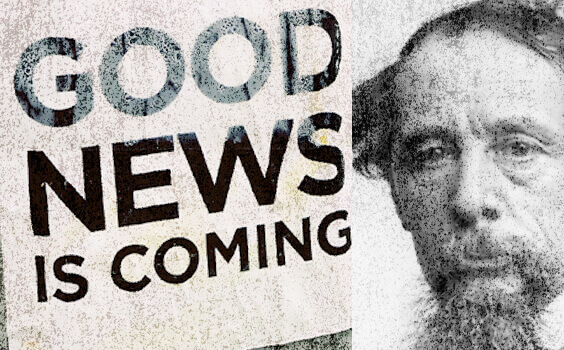Playback speed:
Bent and broken, into a better shape?
-
“After they prayed, the place where they were meeting was shaken. And they were all filled with the Holy Spirit and spoke the word of God boldly. All the believers were one in heart and mind. No one claimed that any of their possessions was their own, but they shared everything they had. With great power the apostles continued to testify to the resurrection of the Lord Jesus. And God’s grace was so powerfully at work in them all.” (Acts 4:31-33)
2020 was the year it all came undone for American exceptionalism, with the loss of personal peace and prosperity, individual freedom, and essentially everything that describes middle class values, nuclear families, and trusted institutions. It was the year that ended the presumption of guaranteed liberty, equality, and racial harmony.
If America were an “empire,” as some of her enemies foolishly claim, it would be ironic that it was accomplished by defeating the crumbling Spanish Empire in 1898. If we think of her as a world “super” power, a mere eighty years have passed since the end of the World War II. Only the Soviet Union was considered a serious rival then. But things have changed now, and the reasons for this are many because America has been gradually eroding from within. And so, the presumption of our global dominance, by any measure, should be in serious doubt, since all that seems to be holding things together anymore is the presumption itself.
From a party politics perspective, only the seeming anomaly of the 2016 election of Donald Trump, prevented, or at least delayed, what we should now admit, and what was to be: the inevitable transformation of a great republic into a failing state. There has been nothing like this story in all of modern history. The greatest nation—not just great—chose to commit political and cultural suicide—enabled by her gaslit citizenry, through cunning deceit.
If we go only by this perspective, and given the evidence of that fateful year, we might be excused for saying, “OK, last one out, turn off the lights.” But, is it really over? Is there some possibility that things can turn around? Can someone, or something, save us from collapse? Well, yes, of course. But, the answer will only be found by reading history. And, of course, The Bible.
We should be spending the time and read the real history books before someone burns them.
At this juncture we should remind ourselves that for people of genuine faith in God, it isn’t really over until He says it is. Happily, for people of genuine faith, the end is in fact the beginning—of a perfect eternity. For the here and now—today—there is a very real possibility that these troubling days may spark a new Great Awakening. In fact this is the very term some are using.
What were the Great Awakenings of the past?
The First Great Awakening began in the 1730s and lasted to about 1740, though pockets of revivalism had occurred in years prior, it is largely credited to the ministry of Solomon Stoddard, Jonathan Edwards’ grandfather. But as American religious historian Sydney E. Ahlstrom noted, “The Great Awakening was still to come, ushered in by the British evangelist George Whitefield.”
The Second Great Awakening (known simply as “The Great Awakening”) began in the late eighteenth century and lasted through the mid-nineteenth century. The center of revivalism was the so-called Burned-over district in western New York. Named for its abundance of hellfire-and-damnation preaching, the region produced dozens of new denominations, communal societies, and reform.
The Third Great Awakening in the 1850s–1900s was characterized by new denominations, active missionary work, Chautauquas, and the Social Gospel approach to social issues. The YMCA (founded in 1844) played a major role in fostering revivals in the cities in the 1858 Awakening and after. The revival of 1858 produced Dwight L. Moody, out of which came religious work carried on in the armies during the civil war. The Christian and Sanitary Commissions as well as the Freedmen’s Societies were formed at that time. (adopted from Wikipedia)

The recently released “The Jesus Revolution” movie produced by Greg Laurie, is based on the most recent, and what many consider to be, the fourth Great Awaking in America. Regardless, it’s thought to be a very important and pivotal episode in modern church history. Time Magazine published the cover story that included Chuck Smith, and his role in this movement on the West Coast, emanating out of his modest Calvary Chapel Costa Mesa church. That was fifty-five years ago—a time of great political and social upheaval for the country.
“Calvary Chapel is an association of evangelical churches, mostly in the Moderate Faction of the Charismatic movement but with former historical origins in Pentecostalism. It maintains a number of radio stations around the world and operates many local Calvary Chapel Bible College programs.” (Wikipedia)
Some 30 years later, I was able to meet Chuck Smith (pictured) and hear him preach in his Costa Mesa church. Later, I met and talked with Greg Laurie when I volunteered to serve in two of his “Harvest Crusades” in Anaheim. These were very impactful times for me personally, shaping my faith as I witnessed this awakening with my own eyes. I guess I was by some measure, a “Jesus Freak” in those days too.
If, and I say if, there is to be a “fifth” Great Awakening, I wonder if it will be credited to Asbury College? It’s too soon to tell. Admittedly, Asbury didn’t conclude as spontaneously as it started.
“‘The Asbury team was just fried, and there was decision fatigue, and just burnout,’ Hall told Religion News Service. He said Brown told him the school’s leaders felt like Asbury’s role was complete. The school said its hope is that revival continues in other spaces.” (Religion News)
Whatever else we might say, these were three great weeks of amazing revival. Some planned events have followed, but I believe we haven’t seen the “breakout” yet that characterized the Great Awakenings of the past. I could, and I hope, be wrong.
All the historic revivals tended to share certain things common:
- There is a powerful moving of The Holy Spirit, as evidence of spontaneous emergence of, and prolonged working of miraculous experiences.
- There is an abundance of prayer, and most importantly, answered prayer.
- There are profound and obvious changes in people and the culture they were living in. (The Welsh Revivals of 1859 and 1904 transformed at least two generations of the Welsh people, and impacted much of the rest of England at that time.)
- There is the music. Great and powerful revivals encourage praise and worship, and the songs that were sung were a beautiful and impulsive response that has remained timeless. Some of the greatest hymns of the faith were born during these eras.
There is one final point that we must acknowledge: “You can’t have ‘revival’ without first the ‘vival.’” The word revival means renewal or awakening. It is impossible to restore something that didn’t exist in the first place. Every Christian, in every family, in every church, in every city, in every part of this country, must pray for their salvation and rescue by God. In an increasingly Godless culture, there must be a revival of the Body of Jesus Christ, before the Body can change the culture. It’s happened before, and it can happen again.
- “O Lord, I have heard the report of you, and your work, O Lord, do I fear. In the midst of the years revive it; in the midst of the years make it known; in wrath remember mercy.” (Habakkuk 3:2)





